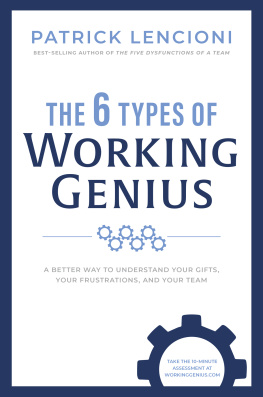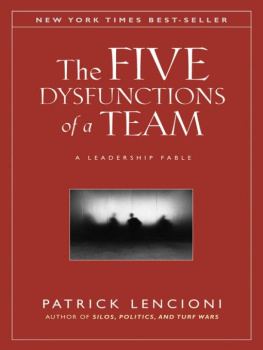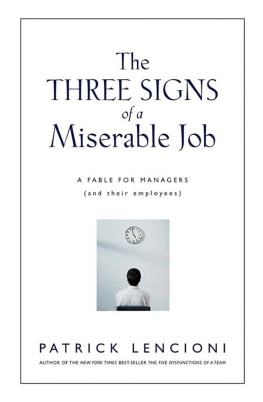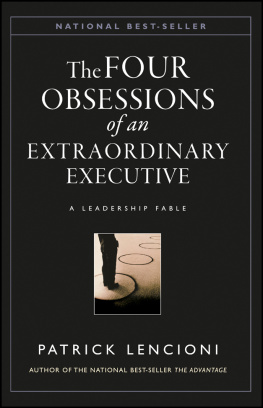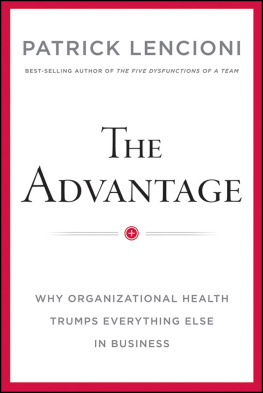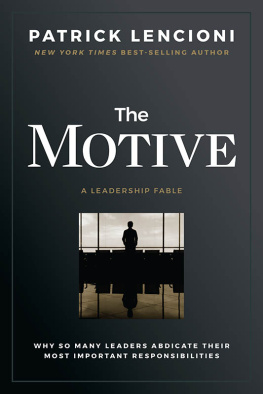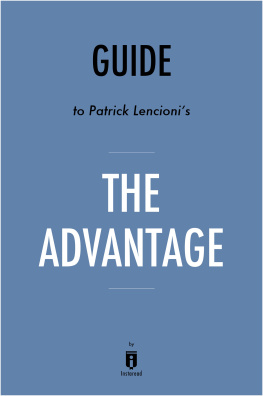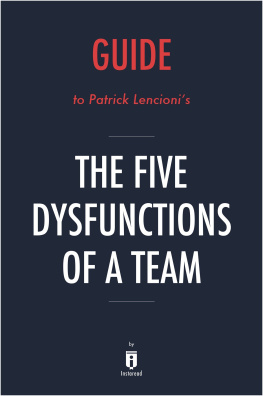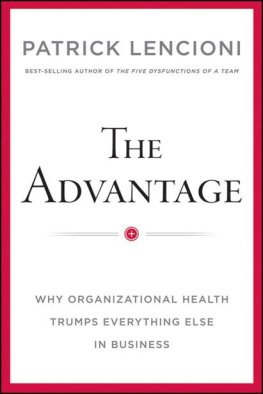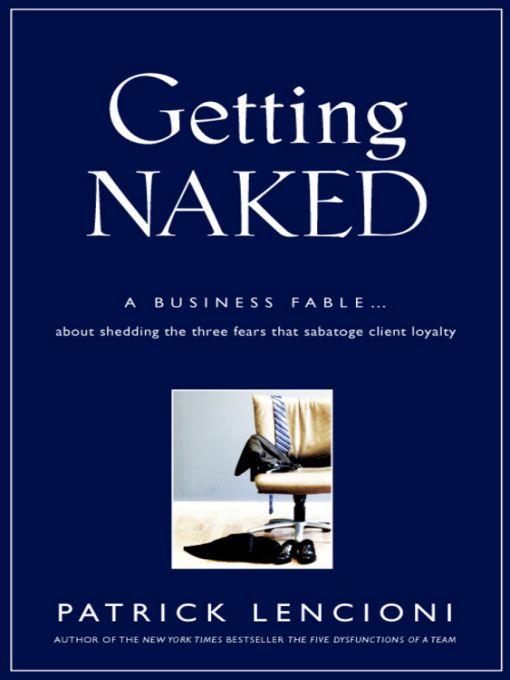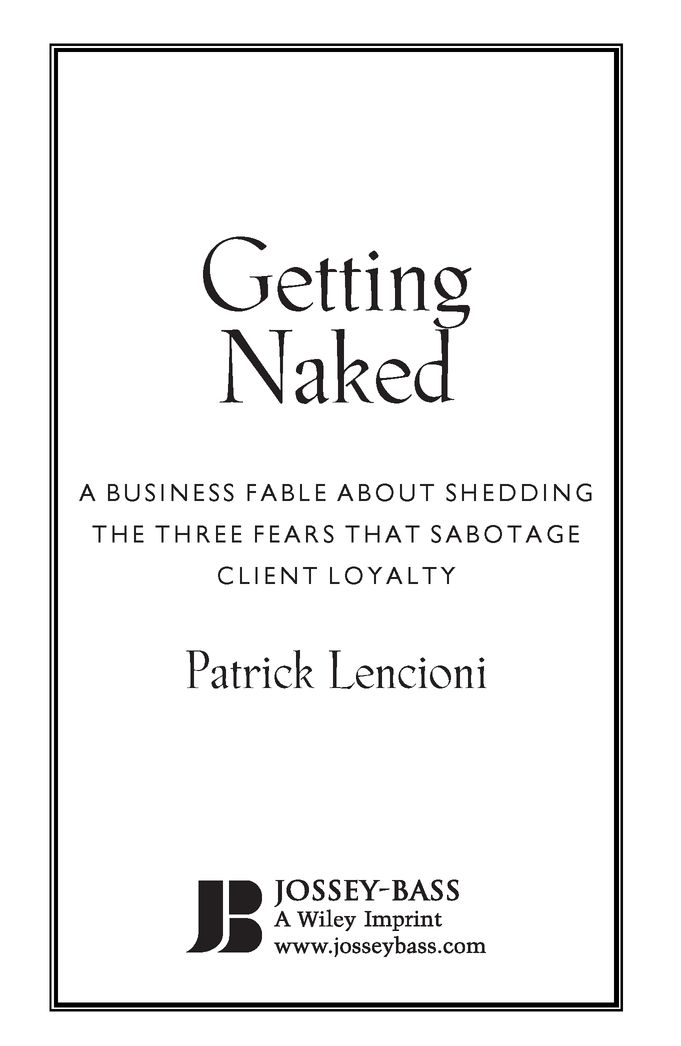Table of Contents
Also by Patrick Lencioni
Leadership Fables
The Five Temptations of a CEO
The Four Obsessions of an Extraordinary Executive
The Five Dysfunctions of a Team
Death by Meeting
Silos, Politics, and Turf Wars
The Three Signs of a Miserable Job
The Three Big Questions for a Frantic Family
Field Guide
Overcoming the Five Dysfunctions of a Team
This book is dedicated to all The Table Group consulting partners around the world who are practicing naked service with clients every day.
INTRODUCTION
Vulnerability. It is one of the most undervalued and misunderstood of all human qualities.
Without the willingness to be vulnerable, we will not build deep and lasting relationships in life. Thats because there is no better way to earn a persons trust than by putting ourselves in a position of unprotected weakness and demonstrating that we believe they will support us.
Yet society encourages us to avoid vulnerability, to always project strength, confidence, and poise. Although this is certainly advisable in some situations in life, when it comes to important, ongoing relationships, it stifles our ability to build trust.
For those who provide service to clients, vulnerability is particularly powerful. Those who get comfortable being vulnerableor as I call it, nakedare rewarded with levels of client loyalty and intimacy that other service providers can only dream of.
Whenever I explain this to an audience, I am often asked, But cant you be too vulnerable? Surprisingly, the answer is no. Of course, if you come to your clients every day admitting that youve made yet another mistake or that you dont know how to do yet another required element of your job, that would be a serious problem. But it would be not an issue of vulnerability, but rather of competence; the problem would not lie in the admitting of so many weaknesses, but in the having of them!
Which reminds me of the flaw in that old adage never let them see you sweat. The truth is, our clients almost always know when we are sweating, often before we do. And so we have a choice. We can either pretend were not sweaty and try to hide our weaknesses, and then watch our credibility erode. Or we can raise up our arms, acknowledge our sweatiness, and show them that we are honest and self-assured enough to be worthy of their trust.
If this is so simple in theoryand Ill be the first to admit that it isthen why do we so often resist being naked with clients?
For one, we think it will hurt our chances for success. We fail to realize that, even though clients require us to be competent enough to meet their needs, it is ultimately our honesty, humility, and selflessness that will endear us to them and allow them to trust and depend on us.
But even if we come to understand this on an intellectual level, most of us will still struggle with vulnerability because we are human beings who dont like to be weak, which means we are subject to the completely natural but irrational fears that make us uncomfortable being naked. This book is about overcoming those fears, which is not easy. It requires levels of self-sacrifice and discomfortand, at times, real sufferingthat few people are willing to endure.
So naked service is rare, which means it provides an opportunity for a powerful and tangible competitive advantage for those who embrace it. They will build stronger, stickier relationships with their clients; theyll have an easier time getting those clients to actively and enthusiastically recommend and endorse them, even without being asked; theyll have more comfortable and collaborative discussions about pricing and fees; and theyll enjoy their work much more.
But more than any of that, what makes naked service worthwhile is that it puts us in a position to more effectively help our clients, which, of course, is what providing service is all about. It is my hope that this little book helps you understand how to do just that.
Okay. Now its time to get naked.
The Fable
PART ONE
Theory
ENEMIES
I cant say that I hated Michael Casey.
For one, Sister Rose Marie Hennessey had taught me in second grade that I should never hate anyone. And besides, I had never actually met Casey. I dont think you can really hate someone you havent met, even if you ignore Sister Rose Maries advice.
But Im not going to lie; Michael Casey was one of my least favorite people in the world. Even the mention of his name could put me in a moderately bad mood.
And so, if you had told me a year earlier that I would spend four solid months of my professional life learning about him and his annoying little consulting firm, I would have told you it was time for me to change careers.
But thats exactly what happened, and Ive lived to tell about it.
ME
Im Jack Bauer, and yes, I share a name with that guy on TV who saved the world every year. Unlike him, though, Im not a superhero. Im just a consultant.
For five years Id been working within the strategy practice at Kendrick and Black, a prestigious, international full-service management consulting firm headquartered in San Francisco.
In addition to being one of the senior consultants in our division, I headed up sales for the strategy practice of our firm. This meant I sometimes competed for clients with Michael Casey and his firm, Lighthouse Partners.
Now, Lighthouse was a much smaller firm than ours, and they focused most of their work in the Bay Area, so we didnt run up against them in more than 5 or 10 percent of the projects that we pursued. But when we did, we lost every single time.
Thats not exactly true. We won once. But a year later the client, a small start-up called DecisionTech, threw us out and hired Lighthouse, which was more painful than losing to them in the first place. What was especially painful was the fact that all of these losses occurred in our own backyard, providing particularly high-profile defeats for all of our local peers to see. This only exacerbated our bitterness toward Michael Casey.
Keep in mind that, unlike in the world of sports, when you compete against a consulting firm you almost never actually see your competitors. But you hear about them. And after listening to story after story about how amazing and smart and effective Michael Casey and his team were, I would have liked nothing more than to hear they were going out of business.
Or so I thought.
HORRIBLE PROMOTION
When I was first told by a colleague that Michael Casey was leaving Lighthouse and that his firm was for sale, I was ecstatic. We had finally worn him down, I decided. There was a chink in their armor after all; no one could be that good.
When I learned that he was leaving to spend more time with his family, my euphoria diminished a little, but not much. Spending more time with your family was one of the most commonly used phrases for papering over a performance issue. Regardless of the reason, Lighthouse was up for sale and we wouldnt have to compete with and be humiliated by them ever again.
My glee at hearing about the demise of my enemy came to an abrupt end five days later when the founder of our firm, Jim Kendrick, pulled the rug out from under me.


